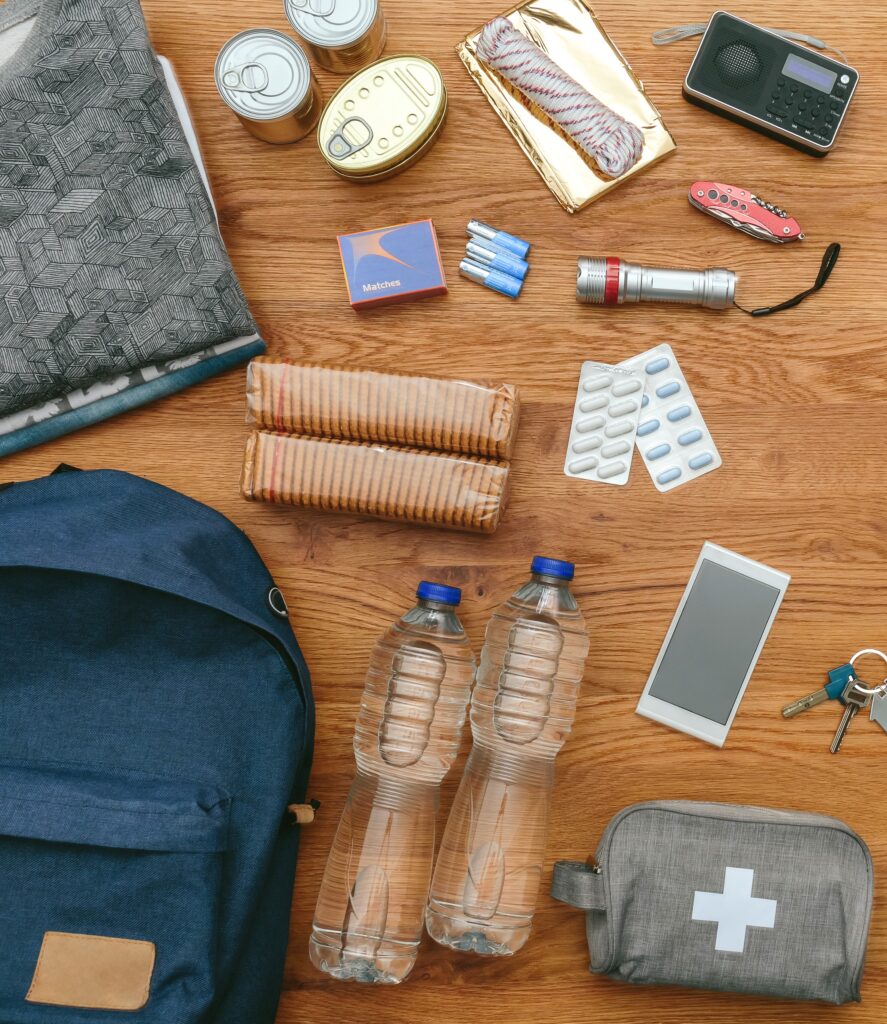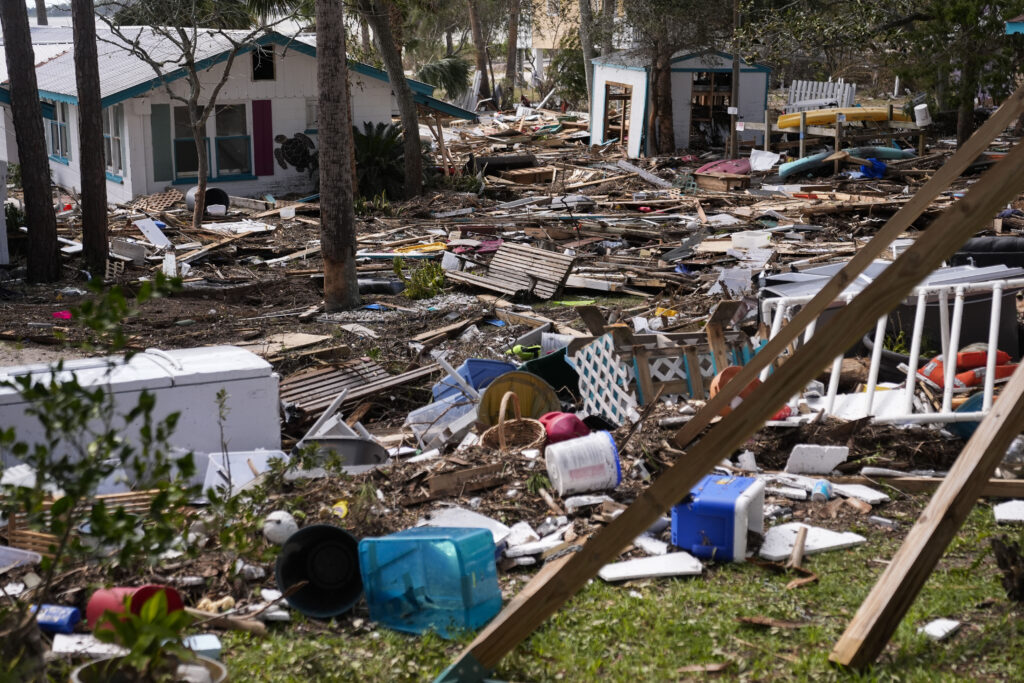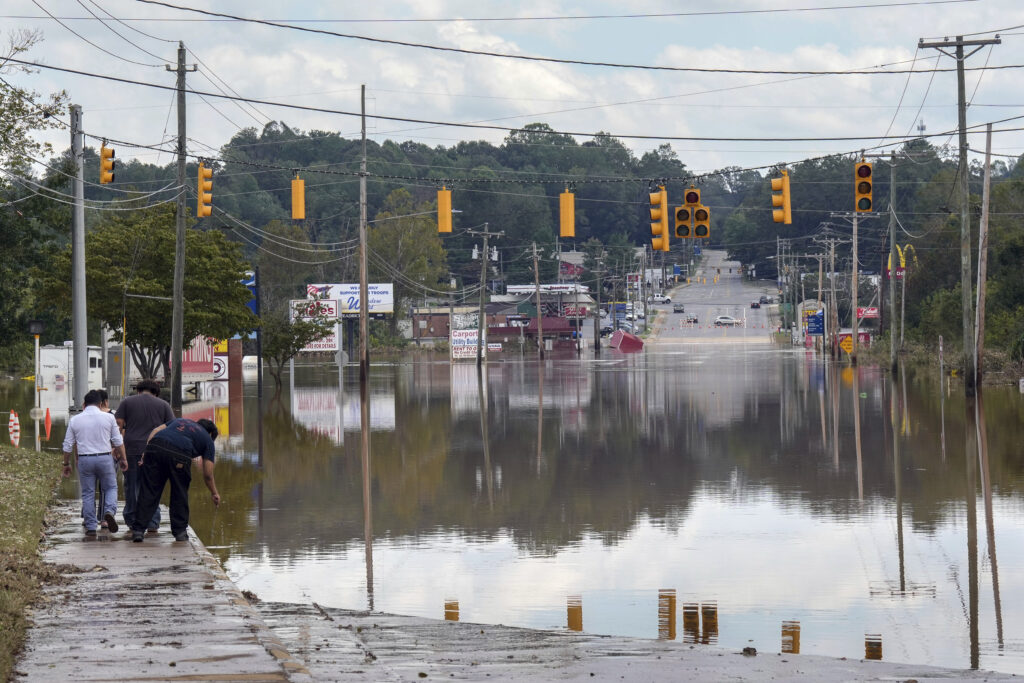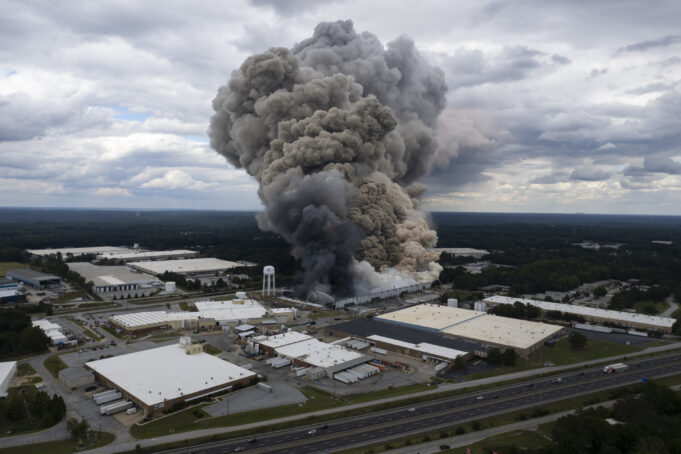Just a few days after Hurricane Helene affected Atlanta, a chemical fire broke out, a boil water advisory was issued and a large gas leak closed a road down.
Additionally, Verizon customers across the country, including Atlanta, experienced outages, dockworkers on the East and Gulf Coasts were on strike, which could have affected consumer goods, and forecasters were monitoring other tropical threats like Milton and Kirk.
The Most Honorable Elijah Muhammad, Eternal Leader of the Nation of Islam, and his National Representative, the Honorable Minister Louis Farrakhan.
Both warned that weather-related and other types of disasters would impact America and taught the importance of proper preparation to survive such times. In 2006, Minister Farrakhan led a delegation to Havana, Cuba, in part, for a disaster preparedness management mission.

“Those who are scripturally prepared know that it is prophesied that we would be living at a time of wars and rumors of wars, pestilence, famine and earthquakes in diverse places.
We are witnessing terrifying disasters afflicting the people of the world and these disasters are now afflicting the United States of America. Believing that these prophesies will be fulfilled, we felt that it is our duty to learn as much as we can, so that we can return to the United States and prepare documents on disaster preparedness,
And in conjunction with local, state and federal government, do all we can to prepare the American people, and our people in particular, for coming disasters,” Minister Farrakhan stated in remarks delivered at a news conference, March 27, 2006, in the island nation.
Tequella Muhammad, a disaster preparedness student based in Atlanta, described recent events impacting the U.S. as “prophetic” and foretold by the Honorable Elijah Muhammad and Minister Farrakhan.
“When you look at ‘The Fall of America,’ he told us the time would come,” she said, referencing the Honorable Elijah Muhammad’s monumental book. “All these things were supposed to happen according to the Holy Qur’an and the Bible,” said Tequella Muhammad.
But, she said, for those preparing themselves and their families, “we shouldn’t be worried at this time. We should not be overwhelmed or stressed with the things that are taking place unless we are not heeding the call, which is to prepare ourselves and our families.”
These recent events speak to the need for disaster preparedness to survive the “Fall of America.”
Back-to-back emergencies
By Oct. 2, the week after Hurricane Helene swept across the southeast, causing destruction from Florida to Virginia, the death toll had risen to more than 227 in six states, and 1.2 million people were still in the dark in Georgia and the Carolinas, according to poweroutage.us.
Hurricane Helene caused massive flooding and mudslides in North Carolina, and the mountainous parts of the state saw widespread devastation. Nearly half of the hurricane’s deaths occurred in North Carolina, according to the Associated Press.
“Communities were wiped off the map,” North Carolina’s governor, Roy Cooper, said at a news conference on Oct. 1. One of those towns was Chimney Rock, N.C., a popular tourist destination. The town was swept into Lake Lure, with photos depicting six inches of debris.
At least 36 people died in South Carolina, surpassing the carnage of Hurricane Hugo in 1989 when 35 people were killed.
In Georgia, the hurricane wreaked havoc from Valdosta to Augusta. While Atlanta avoided some of the massive damage seen in South Georgia, western North Carolina and other places, the city was not relieved from disaster and emergency alerts.
Two days after Hurricane Helene passed through Georgia, on Sept. 29, a fire at a chemical plant caused a haze to spread over metro Atlanta. Residents of three of metro Atlanta’s largest counties—Fulton, DeKalb and Gwinnett—reported seeing the smoke and smelling chlorine in the air.
About 17,000 people were evacuated in Rockdale County, Georgia, where the fire occurred. Those who did not evacuate received a shelter-in-place alert to “remain indoors, close windows and doors, turn off ventilation systems.”
The fire occurred at BioLab, a chemical facility that makes swimming pool and spa treatment products. As of Oct. 2, there were no clear answers as to what started the fire, but it was reignited after being extinguished due to water from sprinklers mixing with a water-reactive chemical.
This was the third time since 2016 that the Rockdale County facility has had a fire, and since 2020, BioLab’s Louisiana facility has had two fires and a chlorine leak.
Chlorine, chloramine and bromine were among the chemicals released from the recent fire.
Short-term exposure to chlorine in the air can cause nose, eye and throat irritation, chest pain and vomiting, according to the CDC’s public health statement on chlorine, written November 2010. Lung injury, fluid in the lungs and death can result at high concentrations.
By midnight after the fire started, on Sept. 30, a boil water advisory had been put into place due to a pumping station failure, affecting parts of southwest Atlanta, Fairburn, South Fulton, Chattahoochee Hills, Palmetto and Union City.
Residents were advised to boil water or use bottled water for drinking, cooking, preparing baby food or brushing their teeth. Community members handed out free water in affected areas. The advisory lasted for 36 hours.

Why disaster strikes
X (formerly Twitter) users pointed out examples of everything that happened in metro Atlanta within a few short days.
“In one week in Atlanta, our children haven’t been able to go to school because of weather, haven’t been able to play outside because of chemical pollution, and haven’t been able to drink water because of crumbling infrastructure,” @ClaraTGreen posted.
“Gas main leak in Henry Co. Biolab Fire in Rockdale. Smoke consuming Atlanta. Coastal Georgia still recovering from Helene. Another storm possibly coming this weekend. ‘If my people …,’” Rev. James “Major” Woodall posted.
He referenced II Chronicles 7:14, which reads, “If my people, which are called by my name, shall humble themselves, and pray, and seek my face, and turn from their wicked ways; then will I hear from heaven, and will forgive their sin, and will heal their land.”
The Honorable Elijah Muhammad has warned America for decades and foretold of her fall in his book, “The Fall of America.” Minister Farrakhan continues to warn America. He has lifted the above biblical verse about America’s fall and the spiritual healing that needs to take place to prevent it.
“The weapons of war have never kept any great empire of yesterday from falling. And the great weapons of war that America has amassed cannot keep America from falling. If she violates the principle that led or leads to perpetuity, then America will go the way of ancient Rome, Babylon, Egypt, Sodom and Gomorrah.
She cannot escape that history with her power because there is no power greater than the power of Allah (God) and the law of justice that follows our every action,” the Minister said during a message delivered on the 6th anniversary of the Million Man March, on October 16, 2001, at Christ Universal Temple in Chicago.
As America and her inner cities face disaster-related and other emergencies, for those who desire to survive the fall of America, it is imperative to know what to do before disaster strikes.

Preparing for disasters
Alva Muhammad based in Chicago and Tequella Muhammad have spent over a decade training in disaster preparedness and teaching others how to survive and what to do in cases of emergency.
Alva Muhammad first got involved in disaster preparedness in 2002 and has been teaching workshops since 2008 and has authored two books on the subject.
The Final Call presents a summarized version of their answers on how to prepare for disasters.
Preparing for different types of disaster events: Take an all-hazards approach to preparation and prepare for any event, whether it’s a hurricane, flood, tornado, earthquake or man-made disaster. Focus on surviving for a minimum of the first 72-hours after a disaster.
“If we can prepare our homes to be independent for 72 hours, then the type of disaster won’t matter as much, because we’ll have the ability to survive,” Alva Muhammad said.
Necessities: Have the basics—food, clothing and shelter.
“We need water. That’s the basic to be able to even have the energy if you have to walk long distances or have to evacuate, just having the energy to be able to get where you need to go, for cooking, for cleaning, for sanitation,” Tequella Muhammad said.
Have a minimum of three days’ worth of water for everyone in the household. Have at least three days’ worth of nonperishable food items. Have the necessary medicine and medical equipment and a way to have electricity (ie: a portable generator) for medical needs that require it.
Other items: Have flashlights, batteries, lanterns and glow sticks in case of power outages or in case you have to evacuate in the middle of the night.
Have a first aid-kit with proper medication for those who need it and a 30-day emergency kit for prescription medication, such as insulin. Have different types of portable charges and car charges. Have life jackets and teach the children how to use them.
Before working on an in-home survival kit, start with a go-bag stocked with first water and food, lighting and communication, such as a hand crank radio to receive updates from the outside world.
“You can use [the go-bag] if you are in the house or if you have to evacuate, either way,” Alva Muhammad said.
Have gas masks for yourself and your family if toxins are in the air, such as in the case of Atlanta’s chemical fire.
Store items like garbage bags, feminine hygiene products, toilet paper and toothpaste. Buy those things in bulk for your family.
In case of evacuation: Always keep your gas tank at least half full. Tequella Muhammad heard of one case where a woman drove around for hours looking for gas and burned her gas out trying to find gas. Gas stations reported long lines and large crowds after Hurricane Helene, and some pumps failed to work due to the lack of electricity.
Family evacuation plan: Talk to your children early about disaster preparedness. Teach them what to do in different situations, such as a power outage or evacuation, and how to contact others. Have them memorize important phone numbers.
Discuss a meetup location if the family were to get separated and know where the place is, how to get to it and what it’s called. Have your children draw a picture of the place.
Ensure every family member has a go-bag. Start with newborn babies and children and pack at least five days’ worth of items, including clothes, food, water and other necessary items, such as diapers and wipes. Have supplies already in the car.
Evacuating the city: Know different evacuation routes, how to get out of the city and how fast it will take you and your family to get into your vehicles and go.
Know where you’re going to go, how far it is and how you are going to get there, especially if highways are shut down and if GPS is not operational. Learn how to navigate your area without GPS.
Have a way to communicate if cell towers are out, such as via walkie-talkies or hand radios. Be ready to rely on maps to get to the destination. When evacuating to a family’s place, memorize phone numbers, and have their emails if you are unable to converse via phone.
“Evacuating your home is stressful. You don’t need the added stress of how to figure out how to get somewhere else, so know how you would leave town if you had to leave in a hurry,” Alva Muhammad said.
Preparing for food and water shortages: Many times right before a hurricane, snowstorm or other natural disaster, people flood the stores to stock up at the last minute. Alva Muhammad and Tequella Muhammad advised against that.
Tequella Muhammad described a Walmart line being wrapped outside and recalled thinking to herself, “If they could even get into the building, there probably would be nothing left on the shelf.”
“Even if you stood in line, even if you had money to get the things, if there’s nothing for you to purchase, then the money is of no value,” she said, referencing a time when store shelves will be empty.
“You don’t want to be caught out at the last minute in a big rush, because it’s not safe,” Alva Muhammad said. “If an order is given to boil water, or an order is given to shelter in place, or an order is given to evacuate, we’re able to hear and obey without having to make a run to Costco in between.”
In Surah 3, verse 49 of the Holy Qur’an, Allah (God) says that He informs “you of what you should eat and what you should store in your houses.”
“We have been taught in the Nation of Islam what to store in our houses, and we should be found doing that. We should have a way to purify water if a boil order is issued. We should have water stocked in our homes in a safe place in case there’s no access to water,” Alva Muhammad said.
Store at least one gallon of water per person per day. If a four-person family prepared to survive for a minimum of 72 hours, that would be a total of 12 gallons of water.
Be sure to rotate the water out when needed. Calculate how much your family eats daily and multiply it by the number of days of survival, whether that’s 72 hours or 30 days.
Start today: “Don’t let the perfect be the enemy of the good,” Alva Muhammad said. “It is best to prepare in whatever way you can than to just throw your hands in the air and say, ‘This is too much. I can’t do it.’”
Tequella Muhammad advised people to “stay in tune with the Honorable Minister Louis Farrakhan.”
“Don’t take these things lightly, because we don’t know what is happening and what’s in store for us,” she said. “Every time we go out to the store, just purchase something that we can put into our kits to be able to prepare for our family.”













